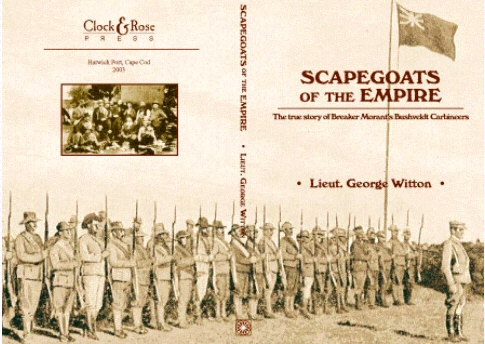Profit & Pleasure: The Bookseller as Publisher
- by Renee Roberts

We recently reprinted George Witton’s Scapegoats of the Empire (1907) in all three formats
By Renée Magriel Roberts
Cape Cod, Harwich Port. About a year ago I was selling a very hard-to-find copy of Britt-Mari Näsström’s Freyja, Goddess of the North to a customer and found the book — how should I describe this? — sticking to my hands. You know the feeling — you’re happy to have the sale, but you realize that you’ll probably never see the book again. I expect that any closet bibliophile/bookseller who has ever dealt with rare books has had the same twinge, felt the same mixed emotions.
Profitability in our area of bookselling usually hinges upon locating truly rare books. There is always a buyer for these books, especially if they are in very good condition. It is always nice to stumble upon these titles at public sales, but with the proliferation of new and amateur buyers who are using the Internet, such finds are becoming ever more scarce. We routinely buy books to upgrade the quality of our inventory, but we see the cost of such investment steadily rising.
In any event, while handling that book on Freyja I experienced a bit of an epiphany: I realized that there were buyers out there who would certainly be interested in the book’s content, and would actually prefer a lower price to a first edition. The more I thought about it, the more attractive the prospect became — isn’t it a bookseller’s dream to have a monopoly on a particular book, as one would have if working with a live author? In the case of rare books, why not copy them before letting the only existing example out of one’s hands? In any event, we contacted Näsström, who (as it happened) had a revised MS in preparation, and we are now the publisher of her book.
For a bookseller selling exclusively over the Internet, the beauty of combining publishing with sales is also obvious. While publishers have to deeply discount books to distributors to get them in retail bricks-and-mortar stores, an Internet bookseller can sell the book at retail, while buying (printing) it at cost. And it’s like printing money; when you need more books to sell, you can just print them.
We made some other decisions critical to our particular clientele and product mix. We decided to focus on high-value scholarly non-fiction in areas where I had some experience, interest and familiarity — history, mythology, literary criticism, religion, the arts, etc, and avoid such fields as the hard sciences. We decided to avoid mass market areas, like popular novels, exposés, and mysteries — books that require a good deal of marketing to create demand. Because our space is very limited, we also decided to publish books in very small quantities, depending upon a higher than usual retail price, rather than having more moderate pricing, but much larger quantities to warehouse and handle. We are not quite print-on-demand, but we’re close to it.